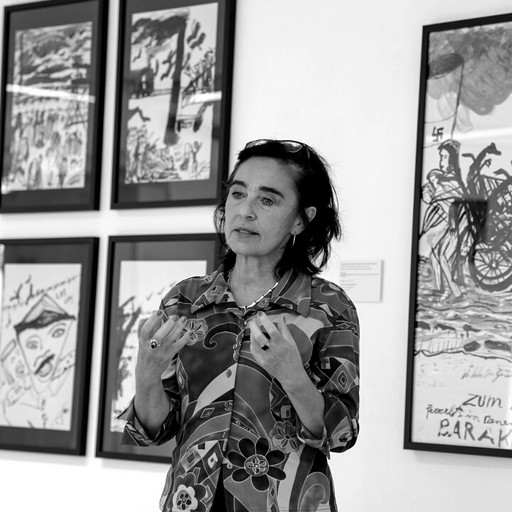Karin Berger, a director and author, comes from the northern Waldviertel in Austria. At the age of fourteen she moved to Vienna to attend boarding school at the Higher Federal Institute for Economic Women’s Professions. She studied ethnology and political science in Vienna until the mid-1980s.Subsequently she worked as a freelance journalist and researcher and completed several research projects during extended periods of study in the USA and Belém, Brazil.
It was during this period that her first work with Super 8 film emerged as well as her interest in and concentration on documentary films. Her first film, Küchengespräche mit Rebellinnen (Kitchen Talks with Rebellious Women), was intended for cinematic release and developed in cooperation with a working group on the topic of Austrian women who resisted Nazism.
Karin Berger approaches the female subjects of her films with respect, but at the same time her work opens up an experiential context that goes beyond the respective individual biographies.
Karin Berger worked on very short films like O! Fortuna! as well as on full-length documentaries. Her cinematic projects are often connected with the publication of books on the same subject, such as the Romní Ceija Stojka’s autobiographies, Wir leben im Verborgenen and Träume ich, dass ich lebe?.
Berger first started focusing on Romani women with a look at one of the most well-known Romani artists in the two films Ceija Stojka and The Green Green Grass Beneath. In her sensitive portrait of Stojka, Ceija, she follows her interest in visualising powerful women and explores her fascinating life as a ‘traveller’, author and painter. She manages to direct a film that opens up the world of Roma people and the conflict with the world of non-Roma prejudices. Her most recent film from 2008, Herzausreisser: Neues vom Wienerlied focuses on recent references to traditional music and, by extension, the Viennese mentality too.
Berger currently teaches practical and analytical approaches to documentary film-making and gives lectures and workshops, for example, at the University of Arts in Linz, with a special focus on visual history and cultural history at the University of Vienna.
References
http://www.karinberger.at/
http://dok.at/person/karin-berger/
Filmography
2008 Herzausreisser: Neues vom Wienerlied, 85 minutes, documentary film, scriptwriter and director
2005 Unter den Brettern hellgrünes Gras, 52 minutes, documentary film, scriptwriter and director, won 2006 adult education TV award
2003 Allegro Moderato, 1 minute, part of Manfred Neuwirth’s Bilder, die das Herz schneller schlagen lassen
1991/1995/2003 O! Fortuna! – Work in Progress, 5.05 minutes, drama-documentary, scriptwriter and director
2000 Ceija Stojka – Porträt einer Romní, 87 minutes, documentary film, scriptwriter and director
1991 Das Wunder von Hoheneich – Eine Wiederbegegnung, 24 minutes, documentary film, scriptwriter and director
1990 Porträts mit ZeitzeugInnen, So richtig vogelfrei: Rosa Winter, 20 minutes; Rückkehr unerwünscht: Fritz Kleinmann, 35 minutes; Kein Ort für Slowenen: Marija Olip, 30 minutes
1985 Küchengespräche mit Rebellinnen, 80 minutes, documentary film, scriptwriter and director, with E. Holzinger, L. Podgornik and L. N. Trallori
1984 Tränen statt Gewehre, black and white, 30 minutes, documentary film, scriptwriter and director, with E. Holzinger, L. Podgornik and L. N. Trallori
Awards
2009 Documentary prize at the International Filmfest Würzburg
2005 Prize awarded by the State of Lower Austria recognising special achievements in the field of media art (documentary film)
1993 Käthe Leichter Prize for Women’s History in the Worker’s Movement
1991 Award from the Theodor Körner Fund for the Promotion of Science and Art
1989 Humanities and social welfare award from the City of Vienna




